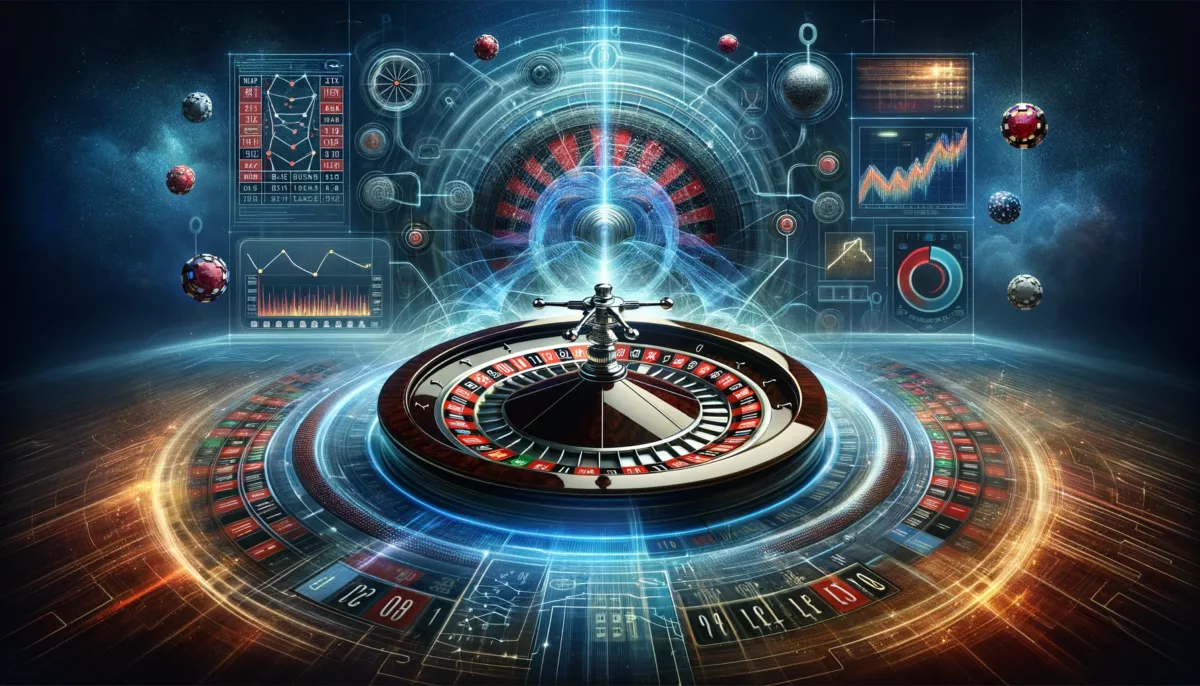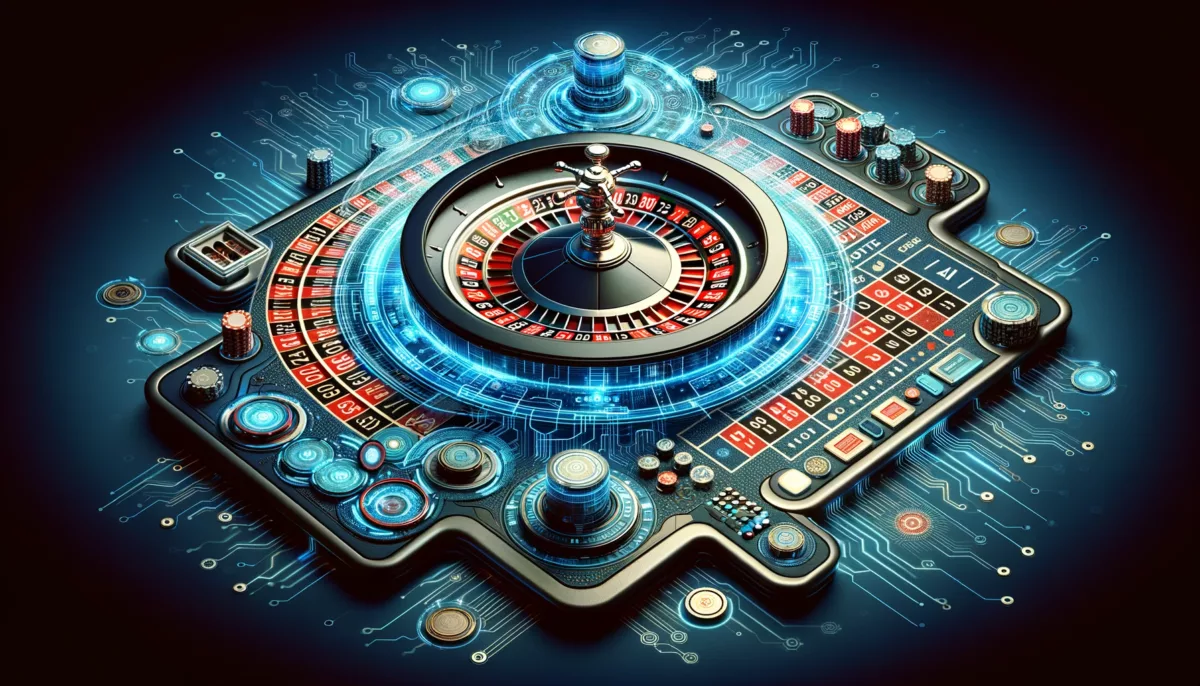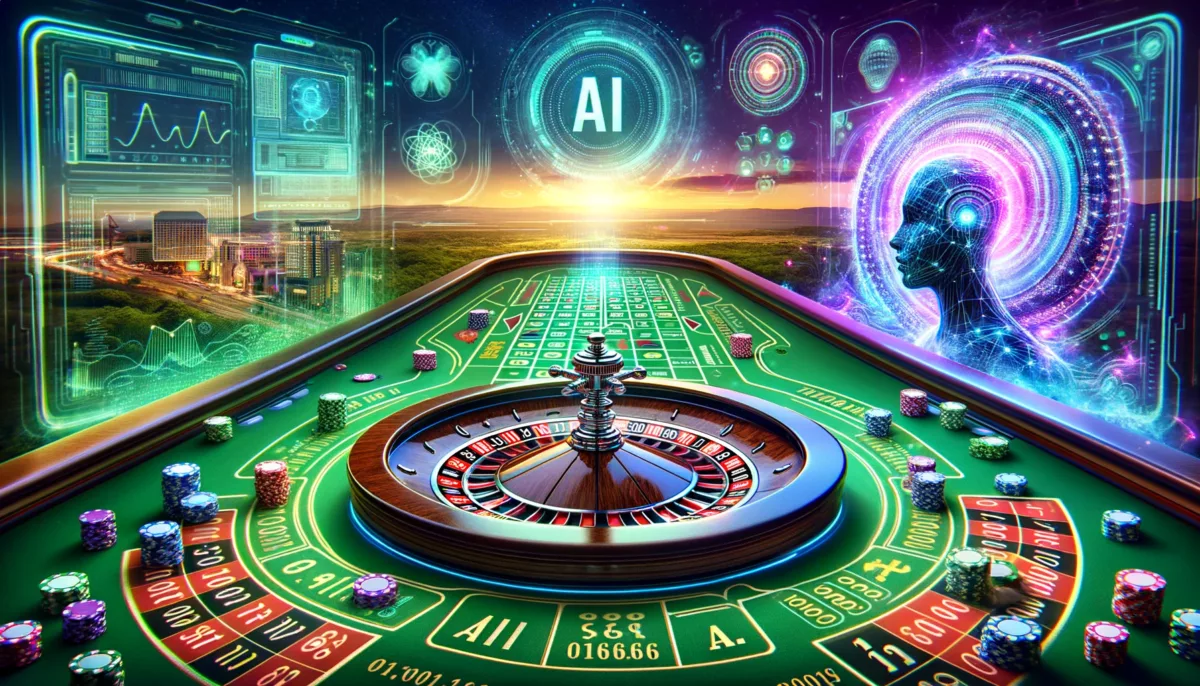
Introduction to AI in Roulette
Brief Overview of Roulette and AI
Roulette, a classic game of chance, has fascinated players for centuries with its spinning wheel and bouncing ball. Its simplicity and suspense have made it a staple in casinos worldwide. The game involves predicting where the ball will land among 37 or 38 numbered pockets on the wheel, depending on the variant—European or American.
In recent years, Artificial Intelligence (AI) has begun to revolutionize this timeless game. AI, in the context of roulette and online gambling, refers to the use of computer systems capable of performing tasks that normally require human intelligence. These tasks include learning from data, recognizing patterns, and making decisions. In the realm of roulette, AI is primarily used for two purposes: enhancing the gaming experience for players and aiding casino operators in maintaining fair play and security.
Evolution of AI in Online Gambling
The evolution of AI in online gambling, particularly in games like roulette, has been both rapid and transformative. Initially, AI’s role was limited to creating more realistic and engaging online casino environments. Now, its functions have expanded to include:
Game Fairness and Integrity: Advanced algorithms analyze betting patterns and outcomes to ensure fairness and detect any anomalies or fraudulent activities.
Personalized Gaming Experiences: AI algorithms can tailor games to individual player preferences, enhancing user engagement and satisfaction.
Predictive Analytics: Casinos use AI to predict user behavior, helping them to provide better services and manage risk.
Chatbots and Customer Service: AI-powered chatbots provide 24/7 customer support, guiding players through gameplay or troubleshooting issues.
Responsible Gambling: AI systems can identify signs of problem gambling and intervene with appropriate resources or restrictions.
The integration of AI into roulette and other online gambling platforms is not just a trend but a significant shift in how these games are developed, delivered, and enjoyed. As AI technology continues to advance, we can expect even more innovative and immersive gaming experiences.
Next, let’s delve into how AI is specifically impacting the game of roulette, discussing the algorithmic intricacies and the role AI plays in predicting outcomes and enhancing player experiences.
The Science Behind AI and Roulette Odds Prediction
How AI Predicts Roulette Outcomes
AI’s ability to predict roulette outcomes hinges on complex algorithms and machine learning techniques. These systems analyze vast amounts of data, including previous roulette results, wheel speed, and betting patterns. By processing this information, AI can identify patterns and probabilities that are imperceptible to the human eye.
Key elements of AI in roulette outcome prediction include:
- Pattern Recognition: AI algorithms excel at identifying patterns in the sequence of winning numbers. Over time, these patterns can provide insights into potential future outcomes.
- Physics-Based Predictions: Some AI systems use physics principles to predict where the ball will land based on the wheel’s speed and trajectory.
- Machine Learning: AI continuously learns from each game, improving its predictive accuracy over time. It adapts to different roulette variants and conditions.
Case Studies: AI in Action
AI Software Ltd: This company specializes in developing AI applications for online gambling. Their innovative approach combines advanced algorithms with user-friendly interfaces, ensuring an enhanced gaming experience. Their work in the field of AI and online roulette has been notable for its emphasis on integrity and fairness. For a deeper understanding of their contributions, consider exploring this detailed AI Software Ltd review.
RouletteAid: RouletteAid stands as a prime example of AI’s application in predicting roulette outcomes. By analyzing past data and employing sophisticated algorithms, RouletteAid offers players insights into potential winning numbers. The technology behind RouletteAid showcases the cutting-edge intersection of AI and gambling, offering a unique tool for enthusiasts and professionals alike. More about this can be found on their RouletteAid page.
Comparative Analysis:
| Feature | AI Software Ltd | RouletteAid |
|---|---|---|
| Focus | AI applications for online gambling | Predicting roulette outcomes |
| Key Technology | Advanced algorithms, user-friendly interfaces | Sophisticated algorithms for data analysis |
| Main Contribution | Enhancing gaming experience, ensuring fairness | Providing insights into potential winning numbers |
| User Experience | Emphasis on game integrity and fairness | Unique tool for enhancing player strategies |
Benefits of AI in Roulette Prediction:
- Enhanced Accuracy: Improves the precision of outcome predictions.
- Data-Driven Insights: Offers players a more informed basis for placing bets.
- Adaptive Learning: Continuously evolves to account for new data and changing conditions.
- Player Engagement: Increases player interest and engagement through innovative technology.

Advanced AI Technologies in Roulette
Machine Learning and Deep Learning Explained
In the world of roulette and online gambling, two prominent AI technologies are machine learning and deep learning:
Machine Learning: A subset of AI where systems learn and improve from experience without being explicitly programmed. In the context of roulette, machine learning algorithms analyze past outcomes and betting patterns to enhance prediction accuracy.
Deep Learning: A more complex subset of machine learning involving neural networks with multiple layers. These networks are adept at learning intricate patterns in large datasets, essential for complex game scenarios like roulette.
For a comprehensive understanding of these concepts, this IBM article is an excellent resource.
Real-Time Data Analysis and Pattern Recognition
Key Functions of AI in Roulette:
- Data Collection: Gathers real-time data from each roulette spin.
- Analysis: Processes this data to identify trends and probabilities.
- Pattern Recognition: AI, especially deep learning, excels in identifying subtle patterns in the outcomes of roulette spins. To explore more about deep learning in pattern recognition, visit Viso AI.
Impact of Real-Time Data Analysis and Pattern Recognition:
| Aspect | Impact on Roulette |
|---|---|
| Prediction Accuracy | Enhances the precision of outcome predictions |
| Strategic Betting | Informs players for more strategic betting decisions |
| Game Fairness | Ensures game integrity by detecting anomalies |
Through these advanced AI technologies, the game of roulette is experiencing a new era of sophistication and engagement. AI’s capability to process and analyze data in real-time, coupled with its pattern recognition prowess, not only enhances the gaming experience but also upholds the integrity and fairness of the game.
Comparing Traditional and AI-Enhanced Roulette Strategies
A Look at Traditional Roulette Strategies
Traditional roulette strategies have been around as long as the game itself. These strategies typically involve betting systems or patterns that players follow in an attempt to beat the odds. Some of the most well-known include:
- Martingale System: Doubling your bet after each loss, with the aim of recouping losses with a single win.
- D’Alembert System: Increasing or decreasing bets by one unit depending on wins or losses, a less aggressive approach than the Martingale.
- Fibonacci System: Using the Fibonacci sequence to dictate betting amounts, increasing stakes following a loss according to the sequence.
How AI Alters the Game
AI-enhanced roulette strategies diverge significantly from these traditional approaches, primarily due to their data-driven nature. AI systems use data analysis and pattern recognition to suggest bets. This shift introduces a new dimension to the game:
- Data Utilization: AI analyzes historical data and current game trends to make predictions.
- Pattern Detection: Advanced algorithms detect patterns and odds that may not be apparent to players.
Comparing Traditional and AI-Enhanced Strategies:
| Aspect | Traditional Strategies | AI-Enhanced Strategies |
|---|---|---|
| Basis | Fixed systems and patterns | Real-time data analysis |
| Adaptability | Static, does not change based on game dynamics | Dynamic, adjusts according to game changes |
| Risk Level | Often high, as losses can accumulate quickly | Potentially lower, as decisions are data-driven |
Pros and Cons of AI-Enhanced Roulette Strategies
Pros:
- Data-Driven Decisions: AI makes more informed decisions based on extensive data analysis.
- Adaptability: AI strategies can adapt in real-time to changing game conditions.
- Potential for Higher Accuracy: AI’s ability to analyze vast amounts of data might lead to more accurate predictions.
Cons:
- Complexity: Understanding and trusting AI-driven advice can be challenging for some players.
- Loss of Traditional Charm: Some players may miss the traditional aspects and simplicity of classic roulette strategies.
- Dependence on Technology: Heavy reliance on technology may detract from the human element of the game.
AI-enhanced roulette strategies represent a significant shift from traditional methods, bringing a data-driven approach to this classic game of chance. While they offer new possibilities and potentially greater accuracy, they also introduce new considerations and challenges.

Ethical and Fair Play Considerations in AI Roulette
Ensuring Fairness and Randomness
Incorporating AI into roulette raises significant questions about fairness and randomness, two cornerstones of ethical gambling. Ensuring that these principles are upheld in an AI-driven environment involves several key factors:
- Algorithm Transparency: Clear understanding of how AI algorithms make decisions is crucial to ensure they are not biased.
- Randomness Verification: Regular checks to verify that AI predictions do not interfere with the inherent randomness of roulette outcomes.
- Independent Auditing: Third-party auditing of AI systems to certify their fairness and impartiality.
Regulatory Aspects and AI
The integration of AI into gambling also brings regulatory considerations to the forefront. Regulators must balance the innovative potential of AI with the need to protect players and maintain the integrity of the game. The PubMed article discusses the complex interplay between technology, ethics, and regulation in modern gambling.
Regulatory Focus Areas:
- Player Protection: Ensuring AI does not exploit player weaknesses or contribute to problem gambling.
- Data Security: Safeguarding player data used by AI systems against breaches.
- Compliance with Gambling Laws: AI applications must comply with existing gambling regulations, which may need updates to address new AI capabilities.
Comparing Ethical Considerations: Traditional vs. AI-Enhanced Roulette
| Consideration | Traditional Roulette | AI-Enhanced Roulette |
|---|---|---|
| Fairness | Ensured by chance and casino integrity | Dependent on algorithm fairness and randomness checks |
| Player Exploitation | Risk mitigated by responsible gambling practices | Increased risk if AI exploits player behavior patterns |
| Regulatory Compliance | Established laws and practices | Emerging area requiring new guidelines and oversight |
Pros and Cons of AI in Roulette from an Ethical Perspective
Pros:
- Enhanced Monitoring: AI can monitor for unfair practices or anomalies more efficiently than human oversight.
- Data-Driven Integrity Checks: AI can use data analytics to ensure game integrity and fairness.
- Potential for Responsible Gambling: AI can identify and mitigate problem gambling behavior.
Cons:
- Algorithm Bias: Risk of built-in biases in AI systems affecting game outcomes.
- Player Privacy Concerns: Use of player data by AI systems raises privacy issues.
- Regulatory Challenges: Keeping up with the fast-paced evolution of AI technologies in gambling poses regulatory challenges.
The integration of AI into roulette is a double-edged sword, offering potential benefits for game integrity and player protection, but also introducing new ethical and regulatory complexities. Navigating these challenges will be crucial for the sustainable and responsible growth of AI-enhanced gambling.
User Experience: AI Roulette from a Player’s Perspective
First-Hand Accounts and User Reviews
As someone deeply immersed in the world of online gambling and AI technologies, my personal experiences with AI-enhanced roulette have been eye-opening. The integration of AI has transformed the game from a purely chance-based entertainment into a more nuanced and interactive experience.
Personal Observations:
- Enhanced Engagement: The use of AI in roulette has added an extra layer of engagement. The thrill of predicting the outcomes, no longer just a game of chance but a more strategic endeavor, has significantly heightened the excitement.
- Data-Driven Decisions: The ability to make informed decisions based on AI-driven data analysis has been a game-changer. It’s fascinating to see how AI algorithms can identify patterns and suggest betting strategies based on real-time data.
User Reviews and Feedback:
- Increased Trust: Many players have expressed increased trust in the fairness of the game, thanks to the transparency and efficiency of AI algorithms.
- Learning Curve: Some users have mentioned a learning curve, as understanding and interpreting AI suggestions requires some time and experience.
- Diverse Experiences: The reception of AI in roulette varies widely; while some embrace the technological advancement, others prefer the traditional roulette experience.
The Future of Player Interaction with AI in Roulette
Looking ahead, the intersection of AI and roulette promises even more transformative changes:
Personalized Gaming Experiences: AI could tailor the gaming experience to individual preferences, adjusting difficulty levels and betting options based on player history.
Voice-Activated Commands: Future AI roulette platforms might incorporate voice recognition, allowing players to place bets and make decisions through voice commands.
Augmented and Virtual Reality Integration: Combining AI with AR and VR could create incredibly immersive roulette experiences, blurring the lines between physical and digital gaming.
Projected Impacts on Player Experience:
- Greater Accessibility: AI could make the game more accessible to a broader audience, including those new to roulette.
- Enhanced Learning Tools: AI-driven simulations and tutorials could help new players learn strategies and game mechanics.
- Social Interaction: AI could facilitate more social interactions, connecting players from around the world in real-time gaming experiences.
In conclusion, the role of AI in roulette is not just about enhancing the game’s fairness or predicting outcomes. It’s about revolutionizing the player experience, making it more interactive, personalized, and engaging. As AI technology continues to evolve, so too will its impact on the world of roulette and online gambling.

User Experience: AI Roulette from a Player’s Perspective
First-Hand Accounts and User Reviews
Drawing from my extensive review of AI gambling tools, as explored in detail on Blockchain Casino Games, my experiences with AI-enhanced roulette have been thoroughly enlightening. These tools demonstrate the profound impact AI has on the dynamics of roulette, shifting it from a game of chance to a more strategic, data-driven experience.
Key Insights from My Reviews:
- Strategic Depth: AI tools provide a strategic depth to roulette that was previously unattainable. This ranges from predictive analytics to behavioral suggestions, offering players a new way to engage with the game.
- Fairness and Transparency: Many AI gambling tools emphasize fairness. Algorithms are designed to be transparent and fair, increasing trust among players.
- User Interface and Experience: The user interfaces of these AI tools are generally intuitive, making complex data and predictions accessible even to newcomers.
User Feedback Compilation:
- Positive Reception to Data-Driven Insights: Players appreciate the data-driven insights offered by AI, which empower them with more control and understanding of their betting strategies.
- Adaptation Period: Some users report a period of adjustment, as relying on AI recommendations can be a new experience for traditional roulette players.
- Diverse Reactions: The reception of AI in roulette is mixed. While tech-savvy players are excited about these advancements, some traditionalists prefer the classic approach to roulette.
The Future of Player Interaction with AI in Roulette
Based on the trends observed in AI gambling tools, the future of player interaction with AI in roulette seems poised for significant developments:
Advanced Personalization: AI could offer highly personalized gaming experiences, using player data to customize game settings and advice.
Interactive and Immersive Gaming: The integration of AI with interactive technologies like AR and VR could revolutionize the player experience, making it more immersive and realistic.
Social and Community Features: AI might enable enhanced social features, allowing players to connect and compete in more meaningful ways.
Implications for Player Experience:
- Accessibility and Learning: AI can make roulette more accessible to novices, providing learning tools and adaptive difficulty levels.
- Enhanced Engagement: Players are likely to find the game more engaging with AI, as it adds a layer of strategy and personalization.
- Varied Player Responses: As with any technology integration, player responses will vary, with some embracing the change and others preferring traditional gameplay.
In summary, AI’s role in enhancing the roulette experience is multifaceted, offering strategic depth, fairness, and an enriched gaming environment. As these technologies evolve, they will continue to reshape how players interact with and perceive the game of roulette.
Conclusion: The Future of Roulette with AI Technologies
Summary of AI’s Impact on Roulette
The introduction of AI technologies into the world of roulette has initiated a paradigm shift in how the game is perceived and played. AI has transcended the traditional boundaries of roulette, turning it into a more sophisticated, data-driven, and engaging game. The impact of AI on roulette can be summarized as follows:
- Enhanced Predictive Capabilities: AI’s ability to analyze vast amounts of data has led to improved predictive capabilities, offering players new ways to strategize.
- Increased Fairness and Integrity: AI tools have the potential to ensure greater fairness in the game by identifying and mitigating any irregularities or biases.
- Personalized Gaming Experiences: AI’s adaptive algorithms have paved the way for personalized gaming experiences, tailoring the game to individual player preferences and skill levels.
- New Layer of Engagement and Interaction: AI has added a new dimension of interaction and engagement in roulette, making it more appealing to a broader audience, including tech-savvy and strategic players.
Predictions and Emerging Trends
Looking towards the future, several predictions and emerging trends can be identified in the realm of roulette with AI technologies:
Integration of Advanced AI and Machine Learning: As AI and machine learning evolve, we can expect even more accurate predictive models and personalized gaming experiences.
Growth of AI in Mobile and Online Platforms: The convenience of mobile and online gambling will likely see a surge in AI-powered roulette games, making them more accessible and popular among players globally.
Ethical AI and Regulatory Developments: With the increasing use of AI, ethical considerations and regulatory measures will become more prominent. This will involve ensuring fairness, transparency, and responsible gambling practices.
Hybrid Gaming Experiences: The future might see a blend of traditional and AI-enhanced roulette, catering to both traditionalists and innovators, offering a diverse range of gaming experiences.
Emergence of New Player Communities: As AI reshapes roulette, new player communities and forums focused on AI-driven strategies and discussions are likely to emerge, further enriching the roulette culture.
In conclusion, the integration of AI into roulette is not just a fleeting trend but a significant development that is reshaping the landscape of gambling. As AI continues to advance, its role in enhancing, personalizing, and revolutionizing roulette will undoubtedly grow, heralding a new era for this classic casino game.
This exploration into the fusion of roulette with AI technologies reveals an exciting future, marked by innovation, enhanced player experiences, and new challenges in the realms of ethics and regulation.







